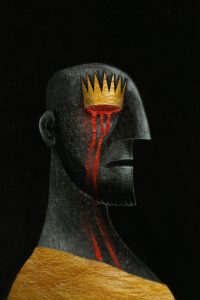King Lear by William Shakespeare and Oedipus Rex by Sophocles are towering works within the Western tragic tradition, both examining the devastating consequences of human pride or hubris, blindness, and the relentless pursuit of truth. These plays, despite originating from distinct cultural and historical contexts, explore universal themes that probe deeply into the human condition. By juxtaposing the structural and thematic elements in both works, we can uncover shared literary techniques and archetypal characters that contribute to their tragic potency. This analysis will explore the structural features of each play, the central themes of fate, blindness, and self-knowledge, and the tragic characterization of both Lear and Oedipus.
The structure of Oedipus Rex adheres rigorously to Aristotelian principles of tragedy, particularly the unities of time, place, and action. Sophocles’ work unfolds within a single location and over a brief period of one day, enhancing the inexorable momentum toward Oedipus’s realization of his fate. This structural unity reinforces the theme of predetermined destiny, as each scene propels Oedipus unavoidably toward his tragic self-discovery. By contrast, King Lear subverts these classical unities, spreading its action across various settings and extending the timeframe, yet Shakespeare’s deviation serves a similar function: the expansive narrative space magnifies the psychological depth and thematic breadth of Lear’s downfall. The dispersed setting of King Lear mirrors the fragmentation of Lear’s mind and kingdom, underscoring the play’s focus on internal as well as external chaos.
Both King Lear and Oedipus Rex grapple profoundly with the theme of fate versus free will. In Oedipus Rex, fate manifests as an omnipotent force against which human actions are futile. Oedipus’s attempts to defy the prophecy only serve to fulfil it, emphasizing the inevitability of fate in Greek tragedy. Conversely, while King Lear lacks a pronounced external prophecy, fate operates through the tragic flaws of the characters, particularly Lear’s hubris and blindness to truth. The apparent agency in King Lear is thus illusory, as the characters’ choices merely expedite their inevitable ruin, mirroring the Greek tragic worldview. Through these divergent approaches, both plays assert the limitations of human agency within the broader workings of cosmic forces.
Blindness, both literal and metaphorical, emerges as a core motif in each play, symbolizing the characters’ inability to perceive their circumstances or inner truths. In Oedipus Rex, Oedipus’s physical sight contrasts with his metaphorical blindness to his own identity and past, culminating in his self-inflicted blindness as a symbol of his enlightenment. Similarly, in King Lear, blindness is not merely physical but psychological. Lear’s refusal to see the genuine loyalty of his daughter Cordelia or the deceit of Goneril and Regan manifests as a moral blindness that precipitates his downfall. The motif of blindness in both plays thus serves as a tragic irony, highlighting how self-knowledge often arrives only after irreversible loss.
As tragic heroes, Lear and Oedipus embody the archetype defined by Aristotle: figures of noble stature brought low by a fatal flaw- in other words the reversal of fortune or peripiteia. Oedipus, whose hubris and relentless pursuit of truth propel him toward self-destruction, exemplifies the classical tragic hero. His journey is one of painful self-awareness, wherein each revelation strips away his illusions of control, exposing his vulnerability to fate. Lear, on the other hand, is driven by pride and a desire for affirmation, leading him to misjudge his daughters’ characters and relinquish his authority. His descent into madness is a psychological unravelling that exposes the frailties and limitations of human wisdom. Both heroes endure a harrowing journey of self-discovery, but while Oedipus attains a painful understanding of his fate, Lear’s realization comes too late to restore either his family or kingdom.
The roles of the Fool in King Lear and Teiresias in Oedipus Rex serve as conduits of truth, albeit through vastly different means. The Fool, with his cryptic and often satirical remarks, illuminates Lear’s blindness to reality, serving as a moral compass that Lear disregards. In contrast, Teiresias embodies the Greek notion of a seer, bearing prophetic insight into Oedipus’s true identity. Both characters underscore the tragic hero’s inability to heed the truth, ultimately reflecting the theme of insight versus ignorance. By ignoring these figures, Lear and Oedipus inadvertently hasten their tragic ends, highlighting the irony that true wisdom is only recognized in hindsight.

Dramatic irony is a crucial device in both Oedipus Rex and King Lear, intensifying the tragic impact. In Oedipus Rex, the audience is acutely aware of Oedipus’s true lineage long before he is, which creates a mounting tension as he edges closer to his horrifying realization. This dramatic irony amplifies the tragic outcome, as each of Oedipus’s actions ironically brings him closer to fulfilling the prophecy he sought to avoid. In King Lear, irony permeates the narrative through Lear’s misjudgment of his daughters; his favoring of Goneril and Regan over Cordelia is tragically ironic, as these daughters are the ones who betray him, while Cordelia remains loyal. This irony underscores the theme of mistaken appearances and highlights the moral blindness afflicting Lear.
Shakespeare’s use of rich, poetic language contrasts with the restrained, formal diction of Sophocles, yet both styles serve their respective purposes. In King Lear, vivid imagery related to nature, madness, and blindness enhances the emotional and symbolic resonance of the tragedy, mirroring Lear’s mental disintegration and the chaos within his kingdom. Sophocles’s measured language, by contrast, reflects the gravity and inevitability of Oedipus’s plight, using stark, unembellished diction to heighten the drama’s severity. In both plays, symbolism—the self-blinding of Oedipus and Lear’s wandering through a storm—serves to externalize the protagonists’ inner turmoil and moral deterioration.
The concept of catharsis is central to both tragedies, as each play evokes pity and fear through the protagonists’ suffering and ultimate self-awareness. Oedipus’s agonizing realization of his sins and Lear’s profound despair over Cordelia’s death leave audiences with a sense of purgation, offering moral reflection on the limits of human understanding. Both plays evoke a powerful catharsis, with Oedipus’s downfall emphasizing the Greek view of cosmic inevitability, while Lear’s suffering underscores a more humanistic exploration of wisdom and folly.
The conclusions of King Lear and Oedipus Rex encapsulate the unavoidable nature of tragedy. In both, the hero’s suffering extends beyond personal loss to devastate their families and societies, reinforcing the moral consequences of their actions. Oedipus’s self-imposed exile and Lear’s death alongside Cordelia illustrate the extensive impact of a ruler’s folly. These endings reinforce each play’s core moral lessons about human vulnerability: Oedipus Rex warns of the dangers of excessive pride and the limitations of human foresight, while King Lear emphasizes the importance of wisdom, humility, and the perils of valuing appearances over genuine loyalty.
To conclude this analysis, Both King Lear and Oedipus Rex reveal the intricate and devastating intersections of pride, blindness, and the tragic search for self-knowledge. Through distinct narrative structures, thematic depth, and compelling character arcs, these tragedies epitomize the power of literature to expose the vulnerabilities of human existence. By comparing these works, we gain insight into how tragedy, across cultures and centuries, confronts the inexorable forces that govern human life.

The Chain Reaction of Us
our story is made of chain reactions – we are just the sum of tiny miracles pretending to be[…]

FIGuring Life Out
Looking at Sylvia Plath’s Fig Tree: On Choice, Possibility, and Growing Into Who We Are I turned eighteen recently,[…]

The F-Word We’re Afraid To Say
WHY ARE WE SO SCARED OF THE WORD “FEMINIST”? There’s a strange, bitter irony in the fact that a[…]


No responses yet